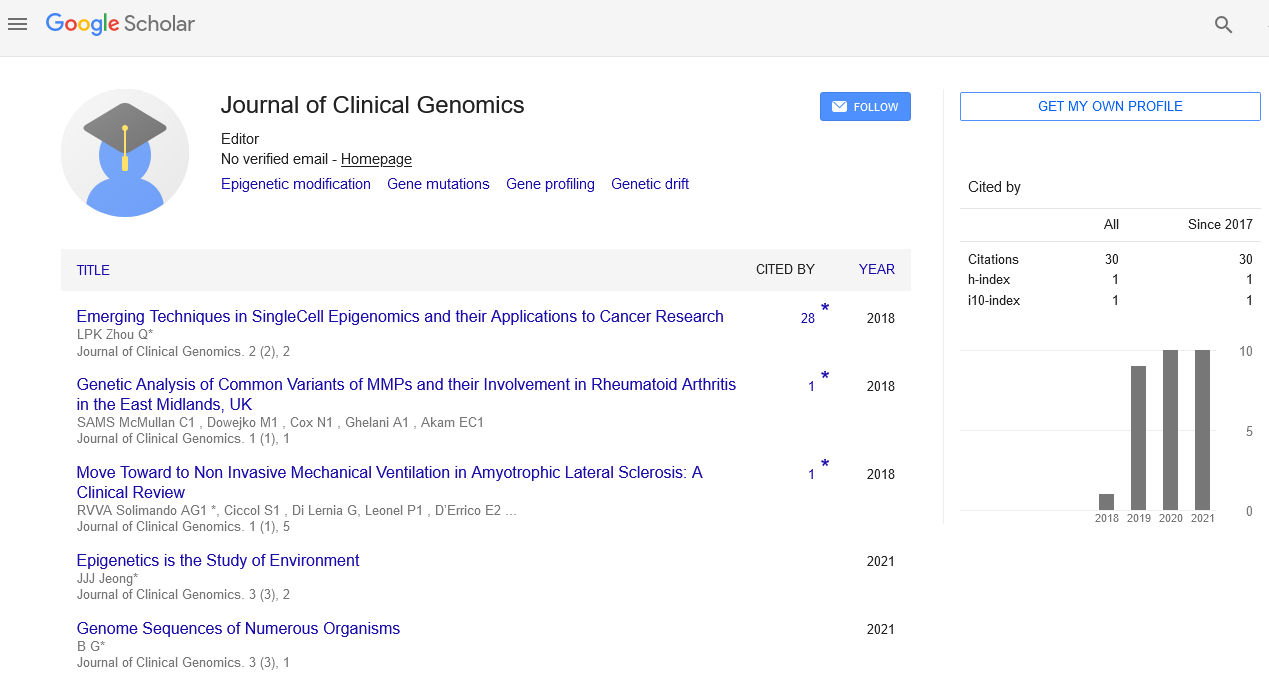Perspective, J Clin Genom Vol: 5 Issue: 4
Evaluating Immunogenomics Methods and its Strategies
Kavin Vincez*
1Department of Oncology, University of Lausanne, Lausanne, Switzerland
*Corresponding Author: Kavin Vincez,
Department of Oncology, University of
Lausanne, Lausanne, Switzerland
E-mail: kavin_vincez@ul22.ch
Received date: 22 November, 2023, Manuscript No. JCG-24-125699;
Editor assigned date: 24 November, 2023, PreQC No. JCG-24-125699 (PQ);
Reviewed date: 11 December, 2023, QC No. JCG-24-125699;
Revised date: 19 December, 2023, Manuscript No. JCG-24-125699 (R);
Published date: 26 December, 2023, DOI: 10.4172/JCG.1000146
Citation: Vincez K (2023) Evaluating Immunogenomics Methods and its Strategies. J Clin Genom 5:4.
Description
The field of immunogenomics represents a cutting-edge intersection between genomics and immunology, offering insights into the intricacies of the immune system at a molecular level. It explores the diverse techniques employed in immunogenomics and their wideranging applications, showing ways on how this field is transforming the understanding of immune responses and opening new avenues for personalized medicine.
Next-Generation Sequencing (NGS) has revolutionized genomics, enabling the comprehensive analysis of entire genomes. In immunogenomics, NGS allows analysts to sequence the entire repertoire of immune-related genes, uncovering the diversity of immune cells and their responses. This technique is pivotal for understanding the adaptive immune system and identifying potential targets for therapeutic intervention.
Single-cell sequencing techniques have emerged as powerful tools for dissecting cellular heterogeneity. Applied to immunogenomics, this method provides a granular view of individual immune cells, allowing analysts to analyse gene expression, receptor diversity, and functional characteristics at a single-cell level. Single-cell RNA sequencing, in particular, has revealed the complexity of immune cell populations and their dynamic responses.
Epigenomic techniques, such as DNA methylation and chromatin accessibility assays, contribute valuable information about the regulatory landscape of immune cells. Understanding epigenetic modifications provides insights into how genes are turned on or off in response to immune challenges. This knowledge is essential for unraveling the mechanisms behind immune cell differentiation and function.
Immunoprofiling arrays allow for high-throughput analysis of immune-related molecules. These arrays assess the expression of genes associated with immune responses, cytokines, and cell surface markers. Immunoprofiling facilitates the identification of biomarkers indicative of immune system status and helps characterize immune signatures associated with various diseases.
Immunogenomics plays a pivotal role in advancing cancer immunotherapy. By profiling the immune landscape of tumors, studies can identify potential targets for immunotherapeutic interventions. Personalized cancer vaccines, immune checkpoint inhibitors, and adoptive cell therapies are examples of how immunogenomics is shaping the future of cancer treatment.
Understanding the genetic basis of autoimmune diseases is a key application of immunogenomics. By identifying genetic variations associated with autoimmune disorders, experts gain insights into the underlying mechanisms and potential targets for therapeutic intervention. This knowledge contributes to the development of more precise and effective treatments for conditions such as rheumatoid arthritis and lupus.
Immunogenomics is instrumental in studying host-pathogen interactions and identifying genetic factors that influence susceptibility to infectious diseases. By analyzing the immune response at a genomic level, analysts can uncover genetic markers associated with resistance or susceptibility to specific pathogens, informing vaccine development and therapeutic strategies.
The era of precision medicine extends to vaccine development through immunogenomics. By analyzing individual genetic variations, analysts can tailor vaccines to specific populations, considering variations in immune response genes. This approach aims to enhance vaccine efficacy and address challenges related to individual differences in vaccine response.
Immunogenomics enables the development of personalized treatment strategies for autoimmune diseases. By understanding the genetic basis of individual immune responses, clinicians can tailor immunosuppressive therapies to maximize efficacy while minimizing side effects. This personalized approach represents a significant leap forward in autoimmune disease management.
Conclusion
Immunogenomics stands at the forefront of scientific innovation, providing a comprehensive view of the genetic underpinnings of immune responses. The techniques employed in immunogenomics, from advanced sequencing technologies to epigenomic profiling, empower analysts to unravel the complexities of the immune system. The applications of immunogenomics, spanning cancer immunotherapy, autoimmune diseases, infectious diseases, and precision vaccinology, hold immense promise for revolutionizing the landscape of medicine. As understanding of immunogenomics continues to deepen, the potential for developing targeted and personalized interventions in the realm of immune health becomes increasingly evident, heralding a new era of precision medicine.
 Spanish
Spanish  Chinese
Chinese  Russian
Russian  German
German  French
French  Japanese
Japanese  Portuguese
Portuguese  Hindi
Hindi 